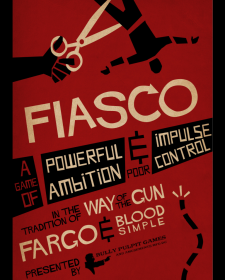Fiasco Reflection

A game played by creating impromptu narratives, Fiasco turned out to be truly a Fiasco! The narratives my group created had several plot twists and questionable outcomes that had all of our heads spinning. Fiasco, a game unlike others, had a set of rules that were not restricting like other games such as Monopoly and UNO. The rules were more of a guideline that gave my group freedom to make our own choices and essentially create a collaborative story. Playing Fiasco was in some sense writing without physically doing that.
The story our group told ended up with all of us ending up in jail at some point or doing something illegal. Each character faced conflicts that we either took extreme measures to get out of or simply did not resolve the issue resulting in their incarceration or another conflict. In order to even start our narratives, my group members and I had to setup the game which essentially formed an introduction. From the setup the plot slowly unfolded. In many ways, this is very similar to any type of writing that intends to tell a story. There is an introduction giving characters’ identity and purpose, a conflict that the characters must resolve, and an ending where the problems are solved. Having to go through this process also shed light on the elements of fiction.
Fiasco was essentially creating a fiction. While creating our narratives, my group realized how difficult it was to create one that made sense. It was easy to begin the story, but creating a logical and coherent storyline was difficult. We had to think outside of the box to create new problems and creative solutions that made the narrative interesting. My group started off with two characters getting busted for possession of marijuana, but there were only so many scenarios we could create without being repetitive.
Fiasco was a completely new game to me and very different from the games we played this semester. I had never played a game that had a set of rules, but in the end was mostly open ended to create our own beginning and end. At the beginning, the game was hard since none of my group members or I had played a game like this. We were not sure if we were doing it correctly, causing us to be hesitant when first creating our narrative. I was thoroughly pleased with the results we came up with though. After figuring out, the storyline quickly picked up.
Fiasco was the first role-playing game I have played, and I believe it was rewarding in doing so. Playing a game rather than actually writing those narratives shed light onto the writing process for fiction works and allowed us to have a different perspective on games in relation to writing. Fiasco essentially allowed my group members to work collaboratively rather than work against each other like we would in a typical game. In the future, I believe having the experience of playing this role-playing game will further improve my writing.
